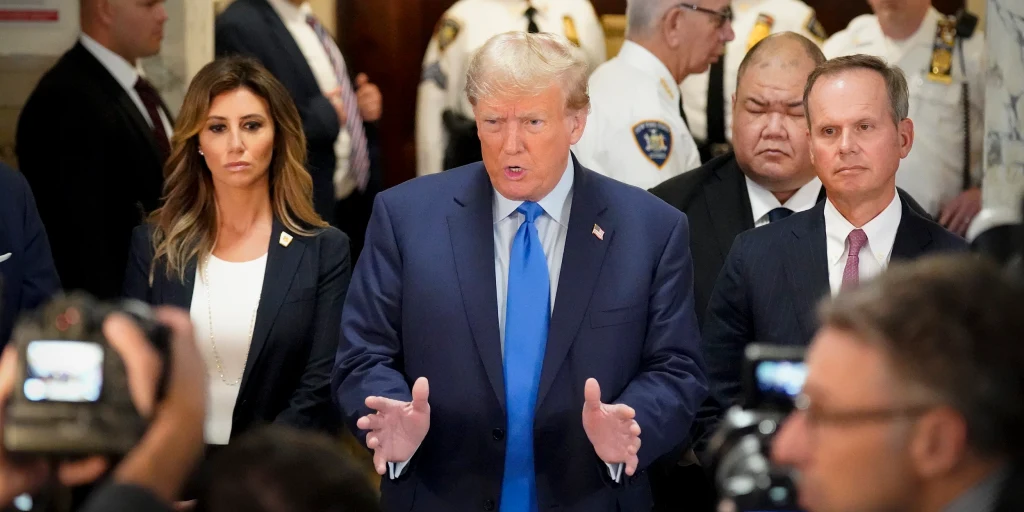Newsmatro

The trial of former President Donald Trump, accused of real estate fraud, kicked off in New York on Monday, drawing significant attention. The civil trial, expected to extend for three months, aims to ascertain the extent of Trump’s financial misconduct while building his real estate empire. Last week, a New York judge ruled that Trump had engaged in fraudulent activities over several years.
New York Attorney General Letitia James is seeking $250 million in damages. Potential witnesses include Trump himself, his children, and former business associates.
In an unexpected move, Trump announced his intention to attend the trial’s first day, a departure from his recent practice of avoiding courtroom appearances. While he hasn’t testified yet, Trump and his supporters spent the day criticizing James, the presiding judge, and other officials, notably as he considers a return to the White House for a second term.
Accusations Against Trump and Legal Complexity
Judge Arthur Engoron is tasked with deciding on six claims in this case, including conspiracy to falsify business records, issuing false financial statements, and insurance fraud. Since there is no jury, the trial may delve into intricate legal questions, primarily focused on financial disclosures.
Prosecutors aim to demonstrate that Trump and the Trump Organization committed fraud throughout Trump’s real estate ventures.
Trump’s Targeting of Legal Officials
Trump and his allies have not refrained from targeting Judge Arthur Engoron, particularly highlighting his initial response to being filmed before the trial’s commencement. Trump has a history of criticizing judges and prosecutors in his various legal cases, including his four criminal indictments this year.
First Witness Testimony
The trial’s first witness, Donald Bender, a tax consultant for the Trump Organization, clarified that he had compiled financial statements for the organization but did not analyze the information. Bender’s testimony faced objections from Trump’s attorneys, but Judge Engoron allowed the evidence to stand.
Supporters and Protesters Absent
Surprisingly, there was a lack of crowds outside the courthouse, unlike Trump’s previous court appearances. The trial’s subdued atmosphere contrasted with the protests during his arraignment in April related to hush money charges.
Upcoming Trials for Trump
Trump faces a packed schedule of potential courtroom appearances, with another civil trial scheduled for January in a defamation lawsuit from E. Jean Carroll. He is also confronting criminal charges in separate indictments in DC, Georgia, and Florida.
Trump’s Defense and Valuation Disputes
Trump’s defense lawyers argue that his financial statements are accurate, emphasizing his successful track record in real estate investments. Trump has consistently claimed that his properties are undervalued, with a recent focus on disputing Mar-a-Lago’s assessed value.
Potential Impact on Trump’s Properties
The outcome of this trial could have significant repercussions for Trump’s real estate holdings. A ruling against him could force the former president to relinquish several high-profile properties, including Trump Tower, a Wall Street office building, golf courses, and a suburban estate.
The Judge’s Background and Trump’s Critiques
Judge Arthur Engoron’s background as a former taxi driver, Vietnam War protester, and long-standing judicial career could come into play during the trial. Trump has criticized Engoron extensively on social media and has called the judge’s fraud ruling “the corporate death penalty.”
Trial Focus and Government’s Perspective
The trial centers on Trump and his company’s alleged deception of banks, insurers, and others by misrepresenting his wealth. Attorney General Letitia James reiterated her stance that Trump had inflated his net worth to enrich himself and evade legal consequences.
Witnesses and Televised Proceedings
The trial may feature key witnesses, including Trump’s sons, Eric and Donald Trump Jr., and Trump Organization employees. While the trial itself is not televised, news organizations have requested permission to broadcast opening statements.
Trump’s Presence and Political Context
Trump’s decision to attend the trial is notable, as defendants in civil cases are not required to appear in person. He has used the trial as a platform to address supporters and frame the lawsuit as a political attack on his potential 2024 presidential campaign.
Trump’s Response to Fraud Allegations
Trump labeled the fraud case as “election interference” and asserted that no crime was committed. He challenged the valuation of his properties, accused the attorney general and judge of corruption, and denounced the legal proceedings as a “scam” and “sham.”
Ivanka Trump’s Exclusion from the Lawsuit
Ivanka Trump was not named as a defendant in the lawsuit, but she has been listed as a potential witness to determine damages resulting from the alleged fraud. The government has not disclosed the specific questions they intend to ask her.
Trump’s Possible Loss of Iconic Properties
The trial’s outcome may force Trump to sell off his iconic properties, should the judge’s ruling hold. The judgment raises the possibility of Trump parting ways with properties like Trump Tower, Wall Street offices, golf courses, and a suburban estate.
As the trial unfolds, it remains a focal point of national attention, with its verdict potentially impacting both Trump’s personal fortune and the political landscape.